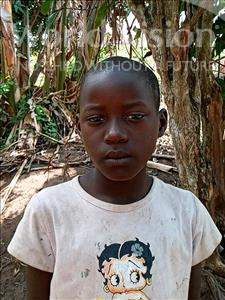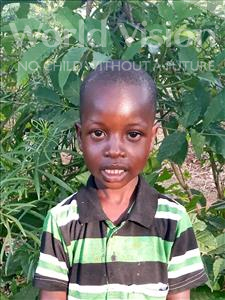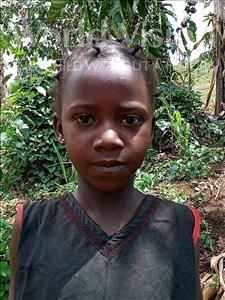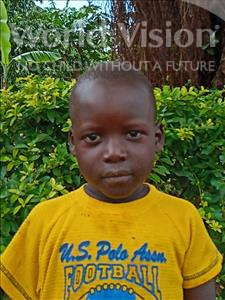Survivor of rape in conflict praises Angelina Jolie and UK government
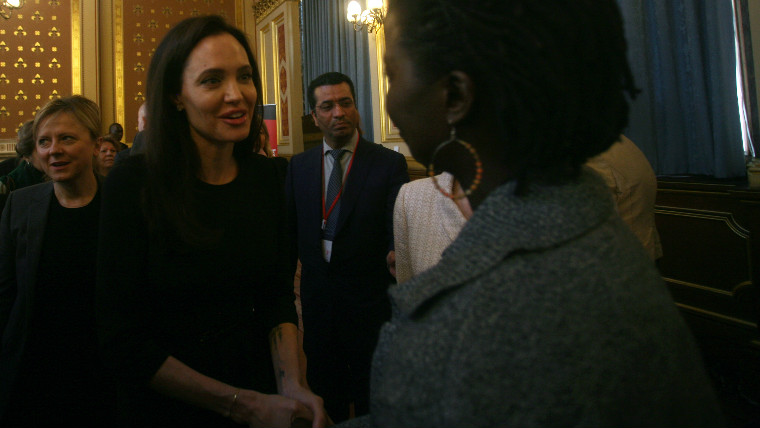
Angela Atim (r) meets Angelina Jolie at UK government sponsored event to end sexual violence in conflict.
Today, on the occasion of the Global Disability Summit, the UK Government became the first major donor of its kind to explicitly pledge support for family and community-based care for all children.
Championing families and not orphanages, Secretary of State for International Development, Penny Mordaunt, announced: “Orphanages are harmful to children and it is often those with disabilities who are placed in them the most. This needs to end, which is why I’m committed to the long-term plan to ensure all children grow up with a family of their own.”
An NGO alliance including Hope and Homes, Lumos, Save the Children and World Vision - have joined forces to echo the UK Government’s commitment and support global change for children trapped in orphanages, especially those with disabilities who are the furthest left behind. The launch ofthe new ‘Civil Society Compact [CSO Compact]’ sets out a pathway for change to help eliminate orphanages worldwide.
“Recognising that institutionalisation harms children – and that children with disabilities are overrepresented in institutions –we commit to work together toward eliminating the institutionalisation of children globally. Ensuring our organisations do not contribute towards the institutionalisation of children, directly or indirectly - and in line with international treaties and best practice, we share the UK Government’s pledge to enable all children to have the opportunity to realise their right to family care.”
World Vision is a proud signatory to the CSO Compact, which is set out in full below.
Now is the time for other governments, funders, companies and individuals to follow suit and invest in alternatives to orphanages so all children can thrive in families.
CSO COMPACT
Recognising that institutionalisation harms children’s physical, emotional, psychological and psychosocial development, the undersigned organisations pledge to work toward the end of institutionalization of children and for the promotion of family-based care.
The occasion of the first Global Disability Summit makes this a particularly appropriate moment for this commitment, since children with disabilities are often the first to enter an institution and the last to leave.
In-line with international treaties and best practice, including the UN Guidelines on the Alternative Care of Children, UN Convention on the Rights of the Child and UN Convention on the Rights of Persons with Disabilities, we share the UK Government’s pledge to enable all children to have the opportunity to realise their right to family care and, in accordance with the 2030 Agenda for Sustainable development, commit to leave no child behind in this effort.
We are committed to ensuring our organisations do not, either directly or indirectly, contribute towards the institutionalisation of children. We are also committed to coordinating our activities and resources to maximise our collective efforts to support the transition to family and community-based care worldwide. Specifically, we commit to coordinating around six key themes:
Raising awareness and understanding in a way that stops the flow of funding and resources in support of orphanages and other types of institutions, and helping to redirect this support to family and community-based solutions. We will also seek to influence our partners, supporters and donors to work in a coordinated way to do the same.
Encouraging the integration of child protection and care services with health and education support in order to promote family-based care and ensure that the wide-ranging needs of children with disabilities and their carers are met.
Advocating with decision-makers - international and national - to prevent the placement of children into institutions, and to ensure that legislation and policy are always derived from a locally developed evidence base on how to best combat the key drivers of institutionalisation.
Investing in (whether financial or in-kind) local partner capacity – civil society and local authorities – to effectively manage the transition from institutions to quality family and community-based care in ways that protect the rights of affected children.
Promoting the meaningful participation of children and young people - actively seeking out, listening to and acting on the views and opinions of the young people and children we work with, and where safe and appropriate to do so, giving them a platform to share their views and ideas more widely – paying particular attention to ensuring gender balance, and the inclusion of children with disabilities and other minority groups.
Researching and generating an evidence base about key issues such as:
· best practice interventions to address the key drivers of institutionalisation;
· the proliferation and poor quality of care in these institutions;
· ways to challenge the invisibility of children in institutions, especially children with disabilities;
· the most appropriate alternative care options for children who cannot live with their own biological family.
To achieve this we will work together to share our data, research findings, methodologies and support countries to gather better data and monitor outcomes for all children. In doing this we will seek to Increase the visibility and understanding of disability issues in children’s care and protection through wider research and routinely disaggregated data collection.
List of signatories
1. Save the Children UK
2. World Vision
3. Plan International UK
4. Human Rights Watch
5. Islamic Relief Worldwide
6. Disability Rights International
7. Hope and Homes for Children
8. Lumos
9. DeafKidz International
10. Home for Good
11. Better Care Network
12. Friends International
13. Chance for Childhood
14. HealthProm
15. Forget Me Not Australia
16. Next Generation Nepal
17. One Sky Foundation
18. Global Initiative to End All Corporal Punishment of Children
World Vision UK joined government ministers, Hollywood star Angelina Jolie and other global campaigners at a Foreign Office organised event to mark the fifth anniversary of the Preventing Sexual Violence Initiative (PSVI) in London.
Activists and advocates of the campaign welcomed the progress PSVI has made since Ms. Jolie - special envoy of the UN High Commissioner for Refugees - launched the initiative with Lord Hague, then UK Foreign Secretary, in 2012. However, the Hollywood star insisted much more needs to be done to defeat the scourge of war zone sex assaults; and called for more prosecutions, increased evidence gathering and better training for armies. World Vision partner and survivor of sexual violence in war, Angela Atim, was part of the panel that addressed the London event yesterday.
All of us involved in addressing sexual violence are proud of the PSVI’s work so far. In Uganda, we live amongst the perpetrators. The support of William Hague, Angelina Jolie, the UK government and NGO’s like World Vision has given survivors strength. Women are now speaking out and seeking justice. We need long term support to help women and their children, born of rape, to live lives free of stigma. If we don't, these children may end up as perpetrators.
- Angela Atim
Ugandan Atim was 14 when soldiers from the Lord’s Resistance Army (LRA) abducted her from her school. She was marched at gunpoint to Sudan, where she was forced to marry an LRA commander leading to years of sexual abuse and torture. Atim escaped the abuse after eight years of captivity. She then received support at World Vision’s Children of War Centre, located in Northern Uganda, and is now a campaigner for victims and their children.
“Since the Global Summit to End Sexual Violence in Conflict in 2014 there has been a lot of change in northern Uganda for the survivors. There was a lot of stigma that has really reduced thanks to the summit and media participation. It really helped the message get round and advocate for the survivors. It has helped empower women who now report their cases. It has really helped give them a voice. It has given them strength. They can go and report incidents to legal agencies that are helping. The mothers have been given courage because they now know people are willing to stand up for them. It’s really saving lives," Atim explained.
At the same event, the Prime Minister’s Special Representative on Preventing Sexual Violence in Conflict, Baroness Anelay, announced new steps to build on the first five years of PSVI. She announced that the UK intends to host a meeting in 2019 to review commitments made at the 2014 London Summit, and to galvanise further international action.
